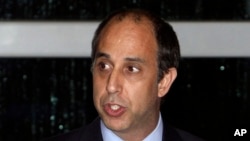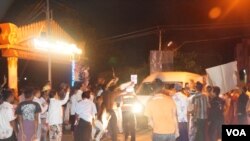BANGKOK —
A U.N. envoy, on an official trip to Burma, has told reporters his convoy came under attack this week by a Buddhist mob and authorities did not protect him.
U.N. human-rights envoy Tomas Ojea Quintana recounted how a crowd of about 200 people punched and kicked the windows and doors of his car while shouting abuse at him Monday in Meiktila, in central Burma.
Speaking to reporters just before departing the country after a 10-day visit, Quintana said the state had an obligation to protect him.
“And that did not happen," he said. "They failed to protect me in that situation. And this issue was raised with the Minister for Foreign Affairs of Myanmar and other authorities.”
The demonstrators denounced the U.N special investigator on human rights as biased in his assessment of the troubles between majority Buddhists and minority Muslims in Burma, also known as Myanmar.
The town of Mektila is where violence against Muslims left at least 44 people dead in March.
Quintana says the incident prevented him from visiting a camp where 1,600 displaced Muslims have taken shelter.
The experience, according to Quintana, gave him “insight into the fear residents would have felt when being chased down by violent mobs” during the attacks in the town five months ago.
During a visit to Arakan state last week, Quintana also encountered Buddhist protesters accusing him of bias.
But Phil Robertson of Human Rights Watch says many other Burmese have appreciated Quintana's scrutiny of sectarian strife in the country.
“His attention in some of the ethnic areas, for instance looking at the situation with the Kachin, has been welcomed by many people on the ground," he said. "Perhaps the government does not like it. But the government is only one aspect of this, it is only [one] player in this scenario. And the larger international community, plus civil society, see him as playing a positive role.”
The watchdog group, Physicians for Human Rights, is warning that Burma risks “catastrophic” levels of conflict, including the possibility of genocide, if authorities do not halt hate speech against Muslims and the culture of impunity in regards to ethnic violence.
Religious violence in the past year in the country has left 250 people dead, mostly Muslims, and another 140,000 have fled their homes.
U.N. human-rights envoy Tomas Ojea Quintana recounted how a crowd of about 200 people punched and kicked the windows and doors of his car while shouting abuse at him Monday in Meiktila, in central Burma.
Speaking to reporters just before departing the country after a 10-day visit, Quintana said the state had an obligation to protect him.
“And that did not happen," he said. "They failed to protect me in that situation. And this issue was raised with the Minister for Foreign Affairs of Myanmar and other authorities.”
The demonstrators denounced the U.N special investigator on human rights as biased in his assessment of the troubles between majority Buddhists and minority Muslims in Burma, also known as Myanmar.
The town of Mektila is where violence against Muslims left at least 44 people dead in March.
Quintana says the incident prevented him from visiting a camp where 1,600 displaced Muslims have taken shelter.
The experience, according to Quintana, gave him “insight into the fear residents would have felt when being chased down by violent mobs” during the attacks in the town five months ago.
During a visit to Arakan state last week, Quintana also encountered Buddhist protesters accusing him of bias.
But Phil Robertson of Human Rights Watch says many other Burmese have appreciated Quintana's scrutiny of sectarian strife in the country.
“His attention in some of the ethnic areas, for instance looking at the situation with the Kachin, has been welcomed by many people on the ground," he said. "Perhaps the government does not like it. But the government is only one aspect of this, it is only [one] player in this scenario. And the larger international community, plus civil society, see him as playing a positive role.”
The watchdog group, Physicians for Human Rights, is warning that Burma risks “catastrophic” levels of conflict, including the possibility of genocide, if authorities do not halt hate speech against Muslims and the culture of impunity in regards to ethnic violence.
Religious violence in the past year in the country has left 250 people dead, mostly Muslims, and another 140,000 have fled their homes.






